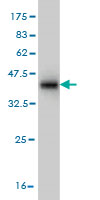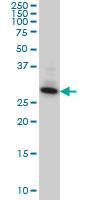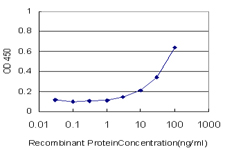SUMF2 Antibody (monoclonal) (M02)
Mouse monoclonal antibody raised against a partial recombinant SUMF2.
- 产品详情
- 实验流程
- 背景知识
Application
| WB, E |
|---|---|
| Primary Accession | Q8NBJ7 |
| Other Accession | NM_015411 |
| Reactivity | Human |
| Host | mouse |
| Clonality | monoclonal |
| Isotype | IgG2a Kappa |
| Clone Names | 4B3 |
| Calculated MW | 33843 Da |
| Gene ID | 25870 |
|---|---|
| Other Names | Sulfatase-modifying factor 2, C-alpha-formylglycine-generating enzyme 2, SUMF2 |
| Target/Specificity | SUMF2 (NP_056226, 26 a.a. ~ 125 a.a) partial recombinant protein with GST tag. MW of the GST tag alone is 26 KDa. |
| Dilution | WB~~1:500~1000 E~~N/A |
| Format | Clear, colorless solution in phosphate buffered saline, pH 7.2 . |
| Storage | Store at -20°C or lower. Aliquot to avoid repeated freezing and thawing. |
| Precautions | SUMF2 Antibody (monoclonal) (M02) is for research use only and not for use in diagnostic or therapeutic procedures. |
For Research Use Only. Not For Use In Diagnostic Procedures.
Provided below are standard protocols that you may find useful for product applications.
BACKGROUND
The catalytic sites of sulfatases are only active if they contain a unique amino acid, C-alpha-formylglycine (FGly). The FGly residue is posttranslationally generated from a cysteine by enzymes with FGly-generating activity. The gene described in this record is a member of the sulfatase-modifying factor family and encodes a protein with a DUF323 domain that localizes to the lumen of the endoplasmic reticulum. This protein has low levels of FGly-generating activity but can heterodimerize with another family member - a protein with high levels of FGly-generating activity. Alternate transcriptional splice variants, encoding different isoforms, have been characterized.
REFERENCES
SUMF2 interacts with interleukin-13 and inhibits interleukin-13 secretion in bronchial smooth muscle cells. Liang H, et al. J Cell Biochem, 2009 Dec 1. PMID 19739097.Paralog of the formylglycine-generating enzyme--retention in the endoplasmic reticulum by canonical and noncanonical signals. Gande SL, et al. FEBS J, 2008 Mar. PMID 18266766.Diversification of transcriptional modulation: large-scale identification and characterization of putative alternative promoters of human genes. Kimura K, et al. Genome Res, 2006 Jan. PMID 16344560.Signal sequence and keyword trap in silico for selection of full-length human cDNAs encoding secretion or membrane proteins from oligo-capped cDNA libraries. Otsuki T, et al. DNA Res, 2005. PMID 16303743.A human protein-protein interaction network: a resource for annotating the proteome. Stelzl U, et al. Cell, 2005 Sep 23. PMID 16169070.
终于等到您。ABCEPTA(百远生物)抗体产品。
点击下方“我要评价 ”按钮提交您的反馈信息,您的反馈和评价是我们最宝贵的财富之一,
我们将在1-3个工作日内处理您的反馈信息。
如有疑问,联系:0512-88856768 tech-china@abcepta.com.























 癌症的基本特征包括细胞增殖、血管生成、迁移、凋亡逃避机制和细胞永生等。找到癌症发生过程中这些通路的关键标记物和对应的抗体用于检测至关重要。
癌症的基本特征包括细胞增殖、血管生成、迁移、凋亡逃避机制和细胞永生等。找到癌症发生过程中这些通路的关键标记物和对应的抗体用于检测至关重要。 为您推荐一个泛素化位点预测神器——泛素化分析工具,可以为您的蛋白的泛素化位点作出预测和评分。
为您推荐一个泛素化位点预测神器——泛素化分析工具,可以为您的蛋白的泛素化位点作出预测和评分。 细胞自噬受体图形绘图工具为你的蛋白的细胞受体结合位点作出预测和评分,识别结合到自噬通路中的蛋白是非常重要的,便于让我们理解自噬在正常生理、病理过程中的作用,如发育、细胞分化、神经退化性疾病、压力条件下、感染和癌症。
细胞自噬受体图形绘图工具为你的蛋白的细胞受体结合位点作出预测和评分,识别结合到自噬通路中的蛋白是非常重要的,便于让我们理解自噬在正常生理、病理过程中的作用,如发育、细胞分化、神经退化性疾病、压力条件下、感染和癌症。








